#she gets all her biases confirmed while inside the construct
Explore tagged Tumblr posts
Text
you ever resent a character's popularity because of how most of the fans reduce them to their characterization in a single scenerio instead of observing how they are in other circumstances as well?
#this post is about Paranoid#can not take posts about how she is the 'MVP' seriously anymore because of this#likes yes. she's very helpful in Nightmare and the epic fight in Apo is fucking great#but don't forget it was her distrust in the princess that got us there in the first place#and that that fight ends up being meaningless because it doesn't actually bring about any new outcome#and just how argumentative and sometimes even mean-spirited she can be like#this birb is SO FUCKIN' STRESSED ALL THE TIME#and that's a detriment to herself and others around her#idk where I'm going with this. I just wish there was more stuff exploring Para's shortcomings and how unhelpful she can be outside of very#specific contexts#it's why I love her and think she's fascinating#she gets all her biases confirmed while inside the construct#that everyone is out to get her. that reality can't be trusted. that the people around you are just trying to manipulate you#and that's a TERRIBLE mindset to foster and have confirmed#like COME ON. THERE'S SO MUCH MEAT THERE!!!#AND I'M JUST. AAAAAAGGGGHHHHH#stp-posting#sal rants
69 notes
·
View notes
Text
Made a post a while back about Little Cato’s lack of laughter (basically nonexistent, it’s actually really sad) and I spotted this in the comments:

So yeah.
Guess what I did.
Gary stood and slammed his hands down on the table. “Oh my crap!”
Avocato nearly choked. “What the hell, man?!” He put his cup down and glared up at his friend. “Warn a dude before you do that.”
“Yeah,” Ash said bitterly, her shirt soaked from the glass of water Fox had pretty much thrown when Gary startled him. “Some warning would have been nice.”
Mooncake floated around Gary’s head. “Chookity-pok.”
“Sorry about that,” Gary apologized, “But I just remembered something incredible.”
Quinn leaned forward. “What is it, Gary?”
“The two best jokes I have ever heard in my life,” Gary said seriously.
Sheryl perked up from the corner of the room. “Are they the ones your father used to tell?” Gary’s grin must have been answer enough, because Sheryl settled back against the wall. “Well then, let’s see if you tell them as well as he did, eh?”
Gary sat back down in his chair and cleared his throat. “Okay. Everyone ready?”
Fox bounced in his seat excitedly. “Oh man, I love jokes!” He frowned. “As long as they’re not rascist.” He narrowed his eyes. “It’s not racist, is it?”
“Nope. Not racist,” Gary reassured him. “So, the joke starts with three construction workers, and-”
“Why construction workers?” Ash asked.
“Because bricks,” Gary answered. “They have this big pile of bricks. And they get super bored, right? So they try to see who can throw one of these bricks up the highest. Problem is, the sun’s super bright, and they can’t see whose went the highest.
“But one of the guys gets an idea. The ground all around them is super muddy, so if they throw up in the bricks and land in the mud-”
“Then whoever’s sank deeper won!” Fox exclaimed.
Gary snapped and pointed at Fox. “Bingo. So the first guy throws up his brick. When it comes down it sinks about a foot into the mud.
“The second says, ‘Pfft, I can top that easy!’ and throws up his brick. And when it comes down it sinks three feet into the mud.
“Now this third guy is real confident. He grabs a brick and says, ‘Oh, yeah? Watch this!’ and he throws up his brick.”
Ash paused the slow process of wringing out her hair. “And?”
“And it doesn’t come back down.”
Everyone glanced at each other, smiles tentatively spreading across their faces. Mooncake landed on the table and gazed up at Gary in confusion. “Pok?”
Avocato hummed. “I’m with Mooncake. I’m not sure that was really much of a joke, Gary.”
Gary fought back a devious smile. “Alright, alright, that’s fair. But wait ‘till you hear this next one.
“A woman and her pet parrot-”
“What’s a parrot?” Fox asked.
Quinn patted Gary’s hand. “Not everyone here knows Earthen species of birds, Gary.”
“Oh right. Okay, so a parrot is a super smart bird that can mimic sound. You can even teach them to talk.”
“Whoa…” Fox said. “And she had one for a pet?”
“Right,” Gary confirmed, “And this lady wanted to take her parrot to see her mom. Because her mom loved parrots. There was just one problem: she was going to have to take a plane, and she couldn’t afford any that would allow her to have a pet on board.”
Ash raised an eyebrow. “Plane?”
“Um…” Gary thought for a moment. “Planes help people get from place to place by flying, but like, inside the atmosphere. Basically, planes are just domesticated spaceships. But anyway, back to the story.
“The only plane she can afford is one that has a bunch of rules. No outside food, no smoking, and worst of all, no pets.
“But she thinks for a while and she decides ‘I could get away with this’. So she sneaks the bird onto the plane by hiding it in her shirt. Everything’s great for a while, the bird is quiet and no one suspects a thing.
“Then the co-pilots comes through, he’s smoking a cigar and greeting people and making sure everyone’s doing okay.”
Fox scowled. “But I thought one of the rules was-”
Sheryl had moved away from the wall and closer to the table. She reached out a hand and patted Fox’s shoulder. “Wait for it, love.”
Gary and Sheryl shared a quick knowing glance before he continued the joke. “So the co-pilot comes through and stops next to her seat. He asks her how her flight’s going and she says everything’s going great.
“Just then, the parrot starts making noise, squawking and talking and just making quiet bird noise in general. The co-pilot gets mad and demands she remove the parrot from her shirt.
“She does, but the guy immediately snatches her bird away.”
“No!” Fox gasped.
“Yes,” Gary said, “And of course she gets mad. She stands up and tells the guy to give her the bird back but he says ‘No, pets aren’t allowed’ so she snatches the cigar out of his mouth and say ‘Cigars aren’t allowed either’.”
“Now the guy is really mad, and he opens up a window, saying ‘You can’t have pets on this plane!’ then he chucks the bird out the window. So the lady retaliates by opening another and window and saying ‘Well you can’t have cigars on this plane!’ and throws it out.
“Now they’re both angry, but they’re also drawing a lot of attention. The co-pilot decides to go back to the cockpit, and he’s all mad and huffy and grumbling to himself.
“But then!” Everyone freezes. “He hears a sound. Something is tapping on the window. He looks out and he sees the lady’s parrot.”
Fox pumped his fist. “Yes! Parrot lives.”
“Chookity!”
“Yep! Parrot lives!” Gary grinned. “And guess what the parrot had in its beak.”
Avocato spoke up. “The cigar?”
“No,” Gary said, “The brick.”
The room went dead silent for about ten seconds. Then a chorus of realization and laughter rang filled the room.
“The brick-”
“Oh my god!”
“Your father told it better, love.”
“You’re biased, Mom.”
“But- but the brick!”
Then another sound rose above the idle chatter and explosive laughter. At first Gary thought maybe they had an intruder on board, because he definitely didn’t recognize the voice he was hearing.
But then he spotted it. The source of the sound.
Little Cato.
Laughing.
Gary tried to remember the last time he had heard Little Cato laugh. And it wasn’t so much that he couldn’t remember, it had just… never happened.
He put his hand on top of Quinn’s head. “Wha-” He turned her so that she was looking at the younger Ventrexian. “Well, I’ll be damned.”
Ash caught sight of them staring and glanced around to find what had caught their attention. As soon as she saw the foreign sight of Little Cato’s laughing, she elbowed her brother. He looked annoyed until she pointed.
Little Cato didn’t seem to notice or care that everyone else had gone quiet. He smacked the table, hunched over in his seat and wheezing as he laughed. It sounded like it should have been loud, but it was too raspy to be as hearty as it could have been, almost like Little Cato’s vocal chords were unused to having a laugh pass through them.
Avocato frowned up at Gary. “What?”
Gary shushed him as Little Cato started to come down from his laughing high. “Dad, oh my gosh, that was the funniest thing I’ve ever heard.” He jumped up. “I gotta go write that down! I’ll be right back!”
As soon as Little Cato disappeared out of the room, Gary grabbed Quinn by the shoulders. “Holy crap! Did you hear that?!”
Quinn smiled. “Yes, Gary, I heard it.”
“He laughed!” Gary exclaimed. “Oh my crap, he laughed!”
Fox blinked. “I’m his roommate. I ain’t never heard that before.”
Ash tucked her hair behind her ear. “You know, I never really thought about the fact that Little Cato never laughs. He should do that more often.”
“Strange,” Sherly said thoughtfully, “Sounded like the kid hasn’t laughed in years.”
Avocato stood up. “What the hell are you guys getting so worked up over? He just laughed.”
“Chookity-pok!”
“He’s right!” Gary said. “A very uncommon occurrence! I’ve known him for months now, and I’ve never heard that!”
Avocato blinked. “What do you mean? He’s the happiest kid I know, he laughs all the time.”
“Maybe he used to,” Fox said, “Not anymore.”
“You guys are serious?” Avocato asked. “But… he’s-”
Quinn put her hand on Little Cato’s arm. “Optimistic.”
“Not to mention upbeat,” Sheryl added. “I don’t think I’ve ever seen someone more excited about a reverse robbery.”
Avocato looked bemused. “A what?”
“Look, ya kid’s not happy, mate,” Sheryl said bluntly, “He’s optimistic and upbeat, but that’s not the same as happy.”
Gary shot her a look. “Mom.”
Sheryl shrugged. “What? I’m just saying what everyone else is thinking.”
“So the whole time I’ve been dead,” Avocato said slowly, “He’s just been… not happy?”
“To be fair, before he was with us, he was with the Lord Commander,” Gary reminded him, “I can’t imagine he’s laughed too much in the past three years. I mean, do you even remember the last time you heard him laugh?”
Avocato hesitated. “I…” He concentrated on the table. “He…” The Ventrexian ended up putting his face in his hands. “When I said I wanted to catch up on what’s been going on with my son, this is not what I had in mind.”
“Pok-pok-pok,” Mooncake interjected. “Chookity-pok.”
Gary smiled. “You’re right, Mooncake. No point in dwelling on the past.” He gave Avocato a friendly punch to the shoulder. “From now on, we make it our personal mission to make sure Little Cato laughs more. Deal?”
“I’m in,” Quinn said.
Ash raised her hand. “Me too. Except I don’t think I’m gonna be very good at it.”
“I’m his roommate,” Fox offered, “I could probably find something that’ll make him laugh.”
Avocato looked around at them. “Looks like my friend made some pretty good friends while I was gone, huh?”
“The best,” Gary agreed. “Now quick, before Little Cato gets back, does anyone know any more jokes?”
#final space#gary goodspeed#quinn ergon#fox#ash#little cato#sheryl goodspeed#mooncake#i need this boy to LAUGH#random disaster writes
197 notes
·
View notes
Text
Holy hell, okay, this is not a drill. Goldie O’Gilt is making an appearance in a comic, and it’s not a cameo.
So, my drug dealer got me hooked with some 2017 Topolino, and I need to scream about it, because Goldie!
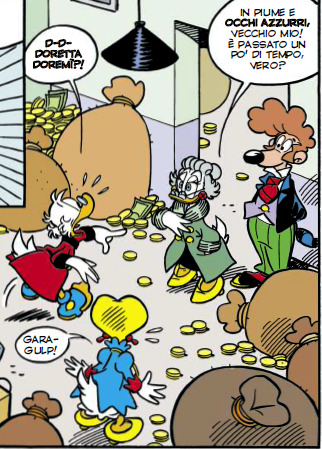
That’s right, she is back, and looks absolutely stunning.
So, this is an Italian comic, and therefore it can be expected that the tragic romance™, that is more popular in the post-Rosa duck comic tradition, has been toned down a lot. Now full disclosure, I’m shipper trash and am fully committed to the tragic romance™. I wrote a 50 000+ words fanfic about it. I am also known sufferer of Brigitta MacBridge nonsense, so while this rant might be biased, I try to be biased in a gentle way. It’s not your fault Brigitta, that you have been written that way. Or that Scrooge and Goldie are soulmates. Ahem.
But to the comic itself. There are lots of things I love about it, and then there are some things that make me side-eye it in vaguely disapproving manner. I swear, not all of those reasons are shipping reasons. Okay yeah they pretty much are.
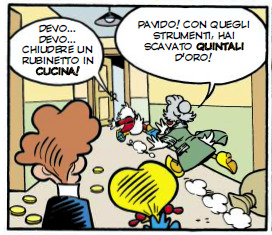
(Quick, follow me to the kitchen, you can throw a coffeepot on my face, and we can roleplay our night together in White Agony Creek anew!)
The premise of the story is pretty much, what if Goldie and Brigitta properly met? It’s…not a lot. There is no plot beyond: what if Goldie and Brigitta had a girls’ day out. Which I guess is fine, because that is all it is supposed to be. It is a slice of life character study. Usually I’m all about those, but…well Goldie doesn’t really shine when you don’t give her anything to do. In Rosa/Barks stories (which are the only stories where we see Goldie as a character) the focus has never been solely on anyone’s feelings. They have been very action-packed stories with any hinted romance taking a firm backseat.
What I’m trying to say is, that I’m disappointed that Goldie didn’t get to join in any of those silly Italian adventures. Not even little bit of shenanigans. Aww, and it could have been so fun too.

(You mean you didn’t come all this way just to ravish me against this discount-yard-sale table?)
Goldie is in Duckburg to collect a debt that Scrooge owes him. Solid beginning. Unfortunately, we never see her collecting this debt! The money issue is dropped from the story way too quickly for my tastes. Because while I 100% believe that Scrooge would avoid having to pay up any dubious debts, I do not believe that Goldie would give up that quickly.
And even more importantly, it would have been hilarious to see some actual petty shenanigans going on between these two. Note that it is mentioned that the original debt was 20$, which Goldie is trying to claim back with stupidly high compound interest. There is a story right there, nothing else needed. Just show me the ridiculous lengths these two are willing to go for 20$, while the rest of Duckburg watches in horror and bafflement. Also, hint that the real reason why these two keep the conflict going is that this way they can spend time together without actually talking about their feelings. Boom, story done. God, they should hire me to make scripts for these comics.
No?
Okay fine, let’s see what the actual story is all about.
Oh yes. Brigitta. This story was all about Brigitta.
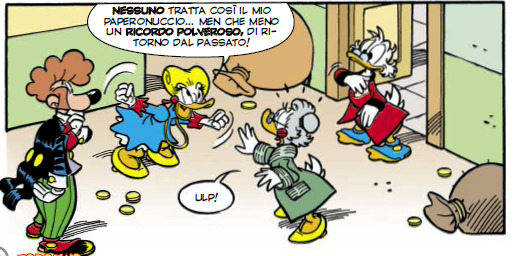
For no good reason whatsoever, Brigitta loses all of her cools over the situation.
1.Don’t call him your Scrooge. You don’t own him.
2.Don’t call Goldie a dusty memory, that’s rude.
3.Goldie had the receipts, she has a genuine claim for that 20$, she’s not doing anything wrong for you to start insulting her!
Yes, yes, she is jealous and all that jazz, but honestly. It’s pretty hypocritical of her to “protect” Scrooge and his 20$ when Brigitta herself so frequently is an antagonist against Scrooge.
The following temper tantrum from Goldie delights me to no end, not because it is aimed towards Brigitta, but because it lines up so perfectly with all of my headcanons for Goldie. Sure, she might act cool and dignified these days, but deep down she is still the hair-trigger tempered diva, that would stay inside a burning building just for the aesthetic.
This has nothing to do with Scrooge, and everything to do with the fact that you called her old. This primadonna will now destroy you mentally, because that’s how she rolls. You will not disrespect the original material girl without consequences.
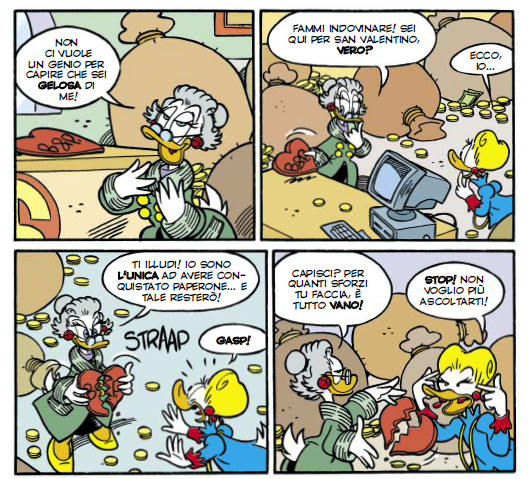
(I am the only person who has ever conquered Scrooge. Wow okay there Goldie, maybe tone it down a bit. I mean, yeah girl you are…but maybe don’t overshare too much.)
Was that kind of a bitchy move? Yes. She is kind of a bitchy person.
My next grumble about this story, is the weird way it deals with Scrooge. I cannot say anything specific…but there is just a really weird vibe to how he is written in here. The weird inner monologue on how he might be able to use the two women against each other to get rid of both of them…was…um.
While my first impression on Goldie’s, I am Scrooge’s number one love interest, speech seemed to be a bit beneath her, I then realised that she isn’t actually saying anything about her own regard for Scrooge. She is bragging about how Scrooge used to be bewitched by her, because that is the kind of thing that a dancehall girl would brag about. Pffft, yes it was Scrooge who was losing his mind over me back in Klondike, I was cool as a cucumber the whole time. Scrooge was nothing more than another notch on my bedpost. I have a heart made of ice, haven’t you heard.
Anyways, Scrooge decides to get rid of Brigitta by confirming everything Goldie just said. And I know that the story wants us to take Scrooge’s words with a grain of salt, because they are just a plan to get Brigitta to leave him alone….which does nothing to make me sympathise with Brigitta.
Putting my shipper heart on the side, pretending to be in love with someone else, to get rid of an admirer, does not create tension for ambiguous love triangle. It is what girls do in crowded bars when some drunk guy doesn’t leave them alone.

(Sorry Brigitta, but can you please leave. I was hoping to get conquered tonight, if you know what I mean.)

(They look like mom and dad getting yelled at by their daughter.)
Once again! What exactly are you mad about!? Which part of, I’m in love with someone else, gives you reason to get angry at them???? Remember that Brigitta at least is supposed to believe Scrooge to be fully sincere in his statement.
Back to Scrooge being a little shit. In a way, I want to be mad about this, but I’m not going to. Because lets not mystify Goldie too much, and pretty much all the rest of Scrooge’s family and loved ones have at least once been sent through that trap door.
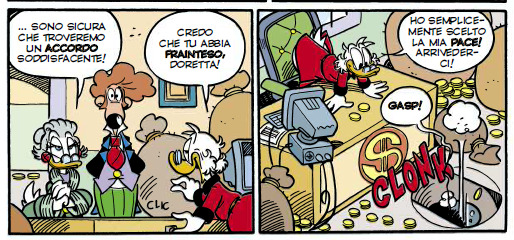
No, let me grumble a little bit after all. I would heartily endorse this, if this was actually about the 20$. But it’s not. The whole thing is framed so that Goldie can have the great epiphany, this is how Brigitta must always feel!
Oh please.
Also, I think that we are supposed to be angry at Scrooge for being so callous towards both of the ladies, so that we can root for them becoming friends later. Which, yeah fine, but do we really have to. One of the things I most despise in Brigitta centred stories is that they by default make Scrooge into a dick. They have to. The whole story has to be built on the idea that Scrooge is just afraid of girl cooties, and therefore has to be pushed a little, so that he will eventually play nice, even with a girl. It is the only way to make Brigitta’s advances feel somehow justified. And in this case the characterisation bleeds to include Goldie under the umbrella of women that I don’t want anywhere near me, because women cost money or whatever.
So, it mostly feels like Goldie has to be booted out of the office, so she doesn’t trick Scrooge into marriage or some other sneaky thing that women are always doing. Sighs eternally.
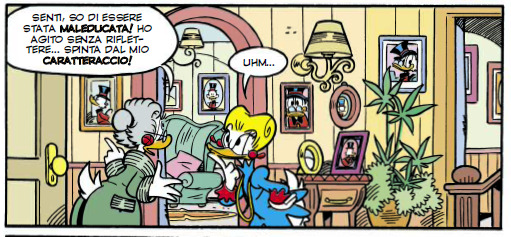
(Oh my god, she is a serial killer. No one else has this many pictures of one person on their walls.)
But this story isn’t even about Scrooge. It is about female friendship. Which is a beautiful thing, and really this story does manage to do lot of things right.

(Hey, can I crash on your couch? Turns out that Scrooge didn’t like it how I called him my conquest in front of you and the staff. He’s always been a bit of a prude like that.)
I’m not really fan of the whole, we have lots in common thing, because they…don’t. And the whole, I now understand your perspective, because now I have been rejected too… doesn’t really work, because Goldie wasn’t proposing anything in the first place. Remember how she was here for that 20$! I do! Can we get back to that! Goldie wasn’t asking Scrooge out, wasn’t asking him to marry her, she was asking for money, and getting the cold shoulder for that should not come as some kind of an epiphany!
Nevermind. That’s cute as heck, I don’t even care how we got there.
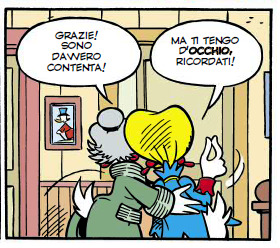
Goldie would make a good mentor for Brigitta. As would Scrooge. The world would be a better place if Brigitta was treated like an over-enthusiastic businesswoman who wants to learn all of Scrooge’s tricks, and Scrooge was treated like grumpy, slightly unwilling teacher.
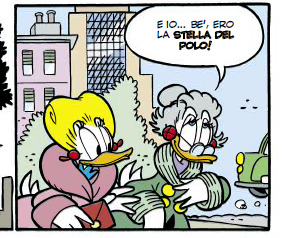
(So, what was Scrooge like when he was young? Oh, you know, very conquerable.)
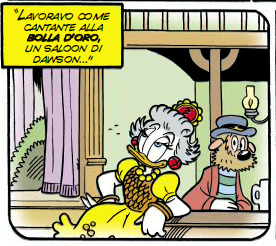
Why is her hair silver, what is this travesty, colouring person you had one job!
Goldie tells Brigitta the story of sleeping pills, thievery, forced labour, kidnappings, and other general criminal activities that make up their tragic romance™.

(Oh, so when you slip him a pill on a first date, it makes you morally complex, but if I did that it would be just creepy and weird!)
(Context Brigitta, it’s all about the context!)
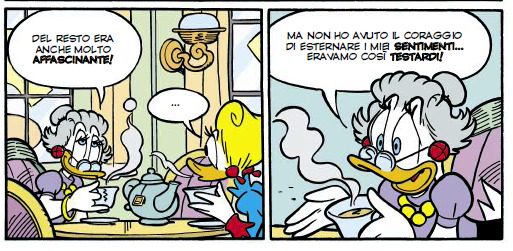
If I was Brigitta, I would feel a bit wary drinking anything with her, after the story she just told.

And then I almost got my hopes up, that something amazing was going to happen! Brigitta started to self-reflect upon herself, and doubting the way her life is now constructed. She admitted that she doesn’t have a positive relationship with Scrooge, and that maybe she is wasting her life. For a moment there, I thought that Brigitta was going to develop as a character.
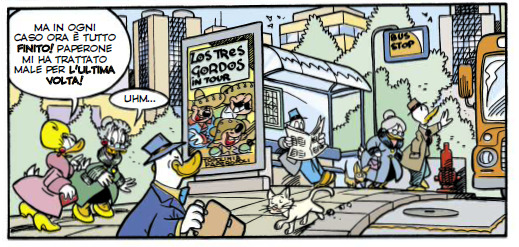
There was a moment. A glorious moment, when I really thought that this was where the official policy concerning Brigitta was going to be changed, and she would stop trying to marry Scrooge. I did get my hopes up.
Aaaaaand, then this happened.

I guess it was inevitable, that Brigitta would get a cheerleading speech from Goldie, to bring back the status quo, but damn does it still feel weird. While I completely, 100% support Goldie’s you are a good and smart woman, if Scrooge doesn’t want that it’s his loss, that is where it should have ended.
Because the part about: because your feelings are painful it means that your love is real, and you shouldn’t give up on them, is complete nonsense. If a relationship is hurting you, it is not worth pursuing!!! Goldie implying that Brigitta’s hurt feelings are the reason she shouldn’t give up on Scrooge, I asdfghjkl, what the fuck!!!!
Secondly, that’s all well and dandy that Goldie now thinks that Brigitta’s love is real, but how exactly does that change anything?! You don’t think that maybe it should be Scrooge who gets to decide who is allowed to make romantic advances towards him!
Scrooge is not an object whose ownership you get to negotiate amongst yourselves!!
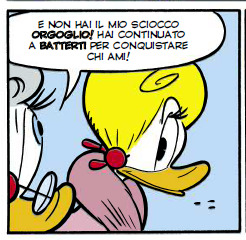
more, or less direct translation: you have continued to beat on to conquer who you love.
That is not a good thing!!

Yeah whatever. Goldie is his past, maybe Brigitta can be his future. Great. And I guess these two making a friendship with each other and admitting that both have the equal right to present themselves as options of romance for Scrooge is kind of mature and respectful towards everyone, if Brigitta wasn’t…you know Brigitta. She has not been known to respect Scrooge’s boundaries.
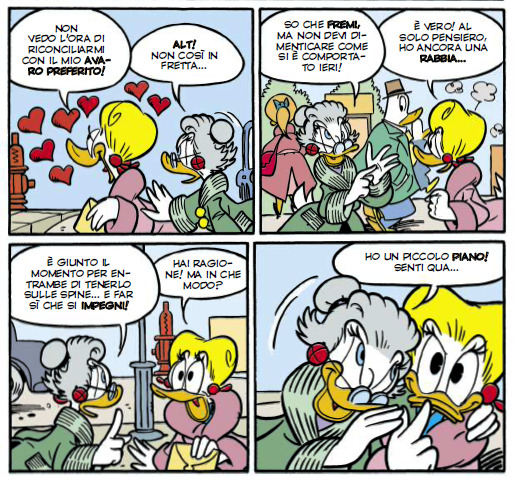
Goldie makes some great faces in here, and I will fully enjoy them. Even if I at the same time roll my eyes at the mandatory, lets punish Scrooge part of any Brigitta comic. You do know that while maybe him booting you, Goldie, out of the office could be seen as mean, he did absolutely nothing disrespectful towards Brigitta. Scrooge owes her zero apologies, because he never even said a mean word towards her! Brigitta had her whole sulk, because she thought that you two were hooking up. That’s not a crime.
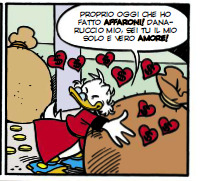
In this continuity, I can understand that Scrooge would prefer to be married to his money. Because these women are written kind of unreasonable.
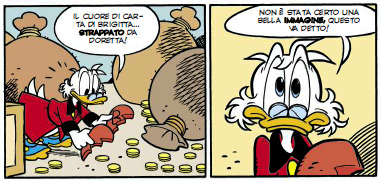
The inevitable self-reflection. Scrooge admits that both women are important parts of his life, and that he does care for both of their well-being. Cute, believable, satisfying. Well done everyone. I still firmly believe that Scrooge sees Brigitta more as a younger sibling than potential lover. But that’s just a headcanon, so feel free to come to your own conclusions.
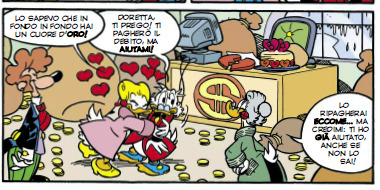

(That is a duck who feels uncomfortable.)
The ladies return to the money bin just in time to eavesdrop on Scrooge’s monologue, and find out that he cared for them both after all. And honestly, I think these pictures tell everything that needs to be said about how much Scrooge cares about Brigitta’s advances.
God, she looks cute, I forgive this story for everything, Goldie is too adorable.
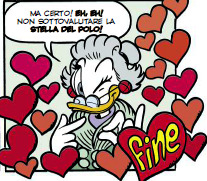
Well, I guess that this was the first time that Goldie has made a proper appearance in the Italian duck universe, and all in all, not bad. Maybe I will get an entirely new look on the story, if it gets properly translated, and I don’t have to play the I’m pretty sure I know what this means, game.
Congrats if you made it all the way here, these ramblings were long.
Ankkaneito returns back to the hole, where she came from.
126 notes
·
View notes
Text
FoZ Notes 20
Here we go. We’re really getting into Elves and the larger state of the world now!
----------------------------------
Somehow Derflinger was fully aware of everything that happened to Saito after the prior swordbody broke. He refuses to talk further on the whole "Gandalfr/Sasha using me to stab Brimir through the heart" thing because Sad.
Tiffania continuing to have self-esteem problems. Dammit. Can we go back to Badass Line Tiffania?
An island (kinda) known as the Dragon's Nest, a bizarre mass of pillars of stone sticking randomly out of the ocean. Luctiana has a friend who lives here. It used to be a volcano, but not anymore. Oh wait the buddy lives somewhere underwater. Luctiana apparently expects Tiffania and Saito to just be able to hold their breath for the whole dive, but when they object she rolls her eyes and casts a spell that lets them temporarily breathe underwater because of course such a spell exists. Oh and she makes Derflinger temporarily rustproof, because of course.
Said waterbreathing spell apparently turns water into air as it enters the throat. That... sounds really miserable, actually, but the story treats that as a perfectly good explanation with no unpleasant implications whatsoever.
Turns out Luctiana's friend is inside one of the pillars. Said friend? A massive Water Dragon called Mother Sea. She's actually a Rhyme Dragon because of fucking course. Dark silver scales that look blue at a glance somehow. Coral horns. Rhyme Dragons live long enough that Mother Sea's grandmother was a little girl six thousand years ago.
Mother Sea asserts that Rhyme Dragons have accepted they're going extinct so, like, whatever man. 's all cool dude. Bizarrely, she talks about God's will instead of, you know, the Great Purpose. And even though she keeps referring to Brimir as The Devil.
Wait, Luctiana is asserting 'barbarians' have no sense of shame in regards to kissing? Goddammit, she introduced herself completely naked and soaking wet! This isn't even cultural difference stuff with deliberate irony. This is just shit writing.
Finally get explicit confirmation that Shaitan's Gate/Devil's Door is the same place Halkeginians call the Holy Land. Derflinger alludes to a "Teleportation Gate", which is probably the same thing. I can already see the writing on the wall: whatever idiocy I'm imagining now regarding the Gate, canon will trump it.
There's a, what, third kind of Water Dragon? It gets compared to both eels and crocodilians. And it's a dumb, aggressive creature. You know, like Saito.
Derflinger just... talking underwater, ain't no thang. I... can't really criticize it (It’s not like he’s got vocal chords or whatever) but I still don't like it.
Submarine hidden in the sea nearby Dragon's Nest. Nuclear sub, specifically. And somehow Saito's Weapon Feedback Bullshit allows Derflinger to know that its power source is 'particles banging into other particles'. aaaargh
To no one's surprise except Saito (because he's retarded) the nuclear sub has nuclear weaponry. Shocking.
Oh my fucking god Luctiana ALSO has a spell for allowing people to talk underwater. (The quality gets compared to a shoddy radio)
For a minute there I thought the author was going to be quasi-intelligent and have Saito consider threatening the Elves by firing the nuke from the submarine. There'd be a lot of problems with this idea, but they're manageable, particularly when you consider that Colbert is a TinkerSpark. But noooo, Saito has looted the thing -because nuclear ICBMs are very small and lightweight, you see- and is thinking to himself how he can threaten the Elves via manually detonating the thing. This is insanely stupid nonsense, quite literally suicidal, and if he has to get close to detonate the thing they can just, you know, wreck the nuke -nukes aren’t even something that detonates explosively when shocked or something! This is just a bad plan on every level I can think of.
Supposedly the familiar summoning spell's words don't matter, only the feeling "in your heart". I have manifold issues with this claim, particularly since it's being introduced out of nowhere to justify Tiffania performing the summoning when the story finally feels like having it actually happen.
Oh my fucking god we FINALLY got a kind of explanation for Tiffania having a Ring of Andvari! Only ten volumes too late! Still no explanation for how she knew how to use the damn thing, though. Oh, and Elf Mom died by lol throwing herself in front of Tiffania when a knight tried to kill Tiffania. Yeah. Sure. THAT makes sense for an all-powerful wargod (ie an FoZ Elf) to do, as opposed to... casting Counter, or making the knight's head explode, or whatever.
Seriously fuck this author.
Elven council meeting room... is at the top of the tower? That's not what we were told last volume. [I seem to have lost almost all my notes from last volume on the Elves? Not sure how that happened. You’re not missing much, though]
"Steed-blooded party", an Elven political faction. They seem to be the Elven version of ultraconservative Catholics. Bidashal hates them.
As is typical of Japanese fiction, political leaders just don't want any fuckups happening on their watch so that nobody can blame them for said fuckups. So the Elven council is a bunch of people who don't want to do anything because they might get blamed if things don't work perfectly.
Bidashal is the Chairman of the Barbarian Countermeasures Committee.
For some reason, the Elves A: know Luctiana brought Saito to the Dragon's Nest and B: find this utterly horrifying. [The second bit actually kind of makes sense later. The first bit is never explained or justified]
Turuk is the current head of the Elven council. He's an old man in the same mold as Osmond, though so far not perverted, just a drunkard... wait a second. Osmond is supposed to be OLD, when we're introduced to him! Like possibly over two centuries old! I think the author entirely forgot about that, given how the story has been talking about Halkeginian and Elven ages for volumes unending.
Elves have a crime of "ethnic rebellion". It's unclear what it is, other than punishable with death. Really not selling me on this noble, peaceful Elves thing, here. The "Steel-bloodedparty" is all about killing traitors and 'devils', further undercutting said noble/peaceful thing. For that matter, the idea that they're wise and stuff is being undercut by how politicking for personal gain is occurring even though the Elves basically think they're on the verge of an apocalypse.
The Dragon's Nest apparently is where Earth crap gets dumped en mass by interdimensional shenanigans.
It's a super-duper secret that Shaitan's Gate connects to our Earth. 'Devils' seems to get used to mean Earth humans.
Elven "Nydus" Navy is made of "Dragon Whales". They look exactly like whales, but with scales. No, really, that's what the text says. I’m not mocking it here. I wish I was mocking it.
Fatima Hadat. A Steel-Blooded Party Elf woman with no practical combat experience but a drill sergeant's attitude anyway. She's trying to make up for an aunt's shameful behavior. Also Steel-Blooded Party members are Soviet Union people?? (Comrade etc etc all the time)
Mother Sea has been collecting the junk from Earth, thinking it's Halkeginian or Elven litter, basically.
Finally the story reveals that Dragon's Nest is Shaitan's Gate/the Holy Land. Credit where it's due: this makes perfect sense and I failed to figure it out before the story spelled it out. Six thousand years ago, this area was dry land.
Elves have rifling, Halkeginians... also have it, but nobles have suppressed it because they don't want peasantry getting good weapons. Eeeeeh. We also hear some nonsense about Halkeginian nobles believing weapons to be 'the path to evil'. Since when? And this is from the omniscient narrator, keep in mind, not some biased character where I could assume they’re just out of touch with the rest of their culture.
I just realized I'm halfway through this volume and Louise hasn't had ANY screentime. Would like to punch the author now.
Saito theorizing Derflinger has an Imp-style memory block Sasha put on him that prevents him from remembering things if they would threaten Elves. Sorry, no, shit explanation. A for effort, F for execution.
Random assertion from Derflinger that only 'skilled' Elves can use Counter. You know, that way we can justify Saito being able to win against Elves even though Louise is absent from the plot. Narratively-convenient construction strikes for the five millionth time! Don't think too hard about the fact that he's facing Elven soldiers who logically should be trained fighters, you'll just get an aneurysm and/or an all-consuming desire to murder the already-dead author.
Elves have Windstone-powered guns that work wet.
Oh. Here's the idiotic payoff of all this shit of Tiffania wanting to meet "Elves like her mother": her mom is Fatima's shame-bringing aunt, and Fatima recognizes her ring’s remains (Because remember, the Stone of Andvari part got used up) and gets pissed. sigh
WHAT the FUCK. Tiffania casting Summon Familiar SUMMONS FUCKING SAITO.
NO. THAT IS BULLSHIT. THIS IS THE FUCKING WORST.
YES IT'S BEING USED TO TURN SAITO INTO A FUCKING GODDAMN DOUBLEFAMILIAR KILLKILLKILLKILLKILLKILLKILLKILLKILL
Over with Vittorio he's talking with Julio about feeling bad about his lies: A, there is no 'device'. B, the Void ritual won't stop the Wind Stone Catastrophe. Sasha, the elf, was Gandalfr+other familiar six thousand years before Saito ARGHBLARGHLE THIS STORY IS SHIT
Now Julio is ALSO BECOMING A DOUBLEFAMILIAR BECAUSE HE'S AN EVEN BIGGER MARY SUE THAN SAITO MURDERVERYTHINGIT'STHEONLYWAY
Ominous dialogue implying it's somehow critically important to have the master/familiar folk die while in love with each other.
Elven airships are dragon-towed. The story pretends like this is a superior methodology to Halkeginian airships. Pffffff.
Utterly bullshit claim that Elves perform trade with Halkeginians, implied claim that Halkeginian nobles hate Elves but civilians aren't afraid of them or anything. So all that shit earlier of peasants thinking Elves are cannibals and so on? lol whatever man consistency is for, like, non-shit writers.
So remember how before there was a Germanian castle at the border of the Elf/Germanian border, in desert? Yeah, NOW there's "the Unexplored Lands", a vat region of forest and plains mostly occupied by demi-humans and separating Elven desert from Germanian land. Consistency is for losers lol!!! (Beastmen, ogres, and avianmen, specifically, not that this means much to the audience)
So you remember how alchemy/transmutation is the most basic of earth magics? Hahahahaha the author doesn't, asserting that Guiche is useless in an aerial battle because earth affinity lol.
Claim Elven airships have never lost to Halkeginian airships.
The Sahara has wild boars. I have no idea how plausible this is, so I’ll let it ago. Even if it is bullshit, it just does not rate compared to the whirling shitstorm of everything else going on.
This volume and the previous are implying there's a fair amount of language shenanigans occurring in the original Japanese. Stuff like Elf/people of the desert and Void/work of the devil being indicated to have been said via kanji shenanigans. I'm sort of disappointed at the evidence being that the unusual choice for desert Elves is probably just a pun that’s not surviving into English.
Urge to kill rising. Ali just saved Saito and Tiffania because... ostensibly because he's saving Luctiana and so he will need their help since saving her makes him a race traitor, but that's bullshit. It's just a super-thin way of ALMOST killing off Tiffania for DRAMA and then not having it stick. Fuck this writer.
Ali ALSO grabbed Fatima, because of fucking course.
So after making a big deal about that submarine [As in: Luctiana found the idea of an undersea boat just fucking unimaginable, and not in the “there’s no way barbarians have pulled that off!” sort of way, but in the “That’s not a thing anyone could possibly do!” sort of way] earlier... it turns out Elves have submarines based on having the Stupid Breed kind of Sea Dragon drag around an airfilled whatsit. This is fucking ridiculous, it's like the author has an active hatred of consistency and quality.
End volume.
--------
Aaaaand that's all she wrote.
Volume 21 is barely translated, and volume 22 isn't translated at all. So I'm done until such time as volume 21 gets translated.
This fucking series, goddamn.
So, since it's not gotten into by this point in the story, I went and used the Familiar of Zero wiki to look up what the fourth Familiar actually does: firstly, they can burn their life force to enhance their master's spells. Which. Why? The story has already established that people can do this with their own life force, why does it require a specific special familiar to be able to tap someone else's life force? Secondly, they can "stockpile spells" to "turn themselves into basically a bomb", whatever the wiki means by that.
Honestly, I'd forgive basically anyone for throwing it out entirely and replacing it with something more consistent with the other Void Familiars. Oh, and if I haven't mentioned it already, the name is Lífþrasir, supposed to be "the heart of God".
So. Yeah. I could see someone having coasted through the prior volumes, not thinking too hard and not noticing how the story is inconsistent nonsense, but holy fuck are we experiencing a sudden, extreme dip in quality. And the worst part is it looks like much of it was intended for a long time, so I don’t think I can blame this on whatever killed the author, if he like died of illness or something.
Fuck this series.
5 notes
·
View notes
Link
I.
THERE’S A PHOTOGRAPH my mother can’t stop thinking about. She is about nine years old in it, dangling from her father’s arms as he dips her low to the ground, a blissful moment she can’t remember, one of the few they shared together. She texts me a picture of it one afternoon, its corner creased from an antique vanity mirror where she keeps it tucked up against the glass. She stares straight at the camera, and I can tell she is laughing, even though her upside-down figure is a blur. My grandfather leans too far forward; I can’t see his face. My mother tells me the photograph still makes her cry, but I wonder: For whom? The girl she once was, or the man he is no longer? That smeary snapshot is a substitute for other memories she’d prefer to forget. Its truth is a necessary fiction.
II.
Ezekiel Hooper Stark is obsessed with family photographs. The narrator of Lynne Tillman’s Men and Apparitions — the author’s first novel in 12 years — pores over them, scrutinizing their subjects, often to the exclusion of his real family. A cultural anthropologist by profession, Zeke ricochets between detached analysis of heirloom pictures — his own, or others fished from flea-market albums — and theories of photography in a 400-page monologue packed with observations on gender, sex, and death. “My self is my field, and habitually I observe, and write field notes,” Zeke proclaims. His book, MEN IN QUOTES, a loose ethnographic study of contemporary masculinity, is excerpted at the novel’s end. Photographs here provide a basis for self-image and self-reflection, and Tillman seesaws between an analysis of physical pictures and an examination of the ways we picture ourselves and others.
“Photographs render worlds,” writes Tillman, and so from the outset Zeke’s world is constructed from photographs — or rather, from the medium of photography itself. “I wished upon the first star that winked at me in a black sky: preserve me, keep me safe,” he recalls, in the hope he might never grow older. Zeke soon learns that photographs cheat the aging process: “At nine I stared at pictures of Mother when she was nine, so cool, Mother, Ellen, a girl, and only I alone could force a Mother into Being.” They give him the power of time-travel, the ability to surround himself with people plucked from the past, like bugs encased in amber. His mother deems him morbid, for she understands photography’s relationship to death, something Zeke discovers only later. The episode recalls Roland Barthes’s photograph of his mother as a five-year-old, which he describes in Camera Lucida (1980) as collecting “all the possible predicates from which [her] being had been constituted,” a total image that rehearses her eventual death while freezing her in suspended animation.
Boy Zeke is a loner, more content to keep company with the dead. Close family and friends appear in static snapshots: “I see the barbecue pit, my father disdainfully flipping burgers.” His narration grows so detached, he calls his kin “the family,” and he refers to his sibling as “Little Sister” in a tone less autobiographical than anthropological. When Zeke’s father dies, his ambivalent eulogy is abruptly intercut with a paean to Polaroid film, which ceased production that same year; he understands his father’s impatience and materialism through the immediacy of the film he once favored.
Zeke’s one close live friend, Mr. Petey, is a praying mantis he spots in the family garden. A flighty endangered species with a talent for camouflage, Mr. Petey is the consummate observer, seeing more than his human neighbors while remaining unaware of ecological threats to his survival. If photography allows Zeke to trap metaphorical bugs, Mr. Petey is one he cannot catch (praying mantises are protected by federal law); but he keeps him in plush effigy, a stuffed witness to the Stark family drama. Mr. Petey might just stand in for a film camera, a mute super-eye threatened with extinction.
When Zeke finally gets his own camera, it gives him a sense of dominion over the world — the feeling it can be captured, developed, cataloged. “I wasn’t into the mechanics of cameras — lenses, focal length, speed — just the imagination behind the camera — me,” he recalls. “I was engaged in me, what was before me, which became a strange ownership, probably symptomatic or evidence of a little person’s pride in what he believes he controls. Silly tot.” His recollection of childish entitlement, which could portend an artist’s ego, is actually the admission of someone terrified by fate’s unphotographable power. What lies beyond the frame always determines what fits within it.
III.
Framing, and the framed, are central to Lynne Tillman’s writing, which ranges freely across genres, from fiction to art to literary criticism. Among my favorite of her creations is Madame Realism, a sage proxy who browses exhibitions at art and historical museums, often addressing the signage and lighting with the same perspicacity as she does the objects on display. From the moment she appeared in a 1986 column in Art in America, Madame Realism made criticism personal, its analysis situated in real space trafficked by real people. In a form of critique reminiscent of Andrea Fraser’s early performances, her observations at once lance visible institutional biases and the hidden forces that instill them. She teaches us how to look, while revealing why we see what we do. Zeke Hooper might be Madame Realism reincarnate: his monologue is an essay, a theory of photography, that reveals as much about its author (Zeke? Lynne?) as it does about our acculturation by images.
Thirty-seven, white, male, and heterosexual, from an upper-middle-class family in the Boston suburbs, Zeke is the kind of guy who likes to hear himself talk. He often concludes self-lacerating statements with “kidding,” a verbal tic that seems somewhat insincere. As he considers the “glut of images” in which we live, his own mind comes to resemble that glut. Personal digressions suggest an intelligent polymath with an empathy problem, too aloof to relate to those closest to him. The novel’s facts start to seem suspicious; Zeke’s research for MEN IN QUOTES is strung through with joking asides and anecdotes that would surely invite academic scorn. Men and Apparitions is a work of fiction as ventriloquy by a winking puppet. If it is criticism, too, it knowingly undermines its own arguments. “A photograph doesn’t speak,” notes Zeke. “If it did it would be just another unreliable narrator.” What else is there?
Good writers are always ethnographers of a sort. They study human behavior in minute detail, connecting actions with their motivations, cultural forms with their social function. Writers are also always untrustworthy. Bias is a fact of writing as much as perspective is a quality of sight. “I don’t pretend I’m ‘just’ an observer,” Zeke proclaims. “In the field, ethnographers become engaged, entranced, involved, even entangled.” Tillman, Zeke, and their readers are both looking and being looked at. This book’s lens is also a mirror.
IV.
Am I a “New Man”? A list of possible criteria, drawn up from Men and Apparitions: self-avowedly feminist, emotional, alienated, resistant to stereotypical gender roles, intimidated by machismo. Perhaps. “New Men” are Zeke’s subject of study for MEN IN QUOTES, though he clearly counts as one, too. He sets out to explore “what are ‘men’ now, after the women’s movement of the 1960s and 1970s, feminism, generally, how has that changed us, in what ways, and the women we know and love or hate, and what do we want from women.” The sample of men he interviews is self-selecting, composed of familiar peers. His true subject, it seems, is himself: “I could shape myself into an ethnographer without a knowing attitude, and could learn as much about my own as ‘the other,’ or discover the other inside.” At his core, Zeke feels alienated by society’s expectations of men, as if his privilege affords him no feeling of ownership over the world he was meant to master.
Zeke craves intimacy with women and is drawn to their strength, but he is ultimately more comfortable keeping them at a distance. The women he understands best live in silver gelatin: a long portion of the novel is dedicated to Clover Hooper Adams, a distant relative and amateur photographer, whose work was much acclaimed by her circle of New England patricians, including close confidant Henry James. There’s evidence James based his “Pandora” (1884) on her, a whip-smart, creative “New Woman” to match Zeke the New Man. Several of Clover’s photographs appear here, along with excerpts from letters she wrote to family and friends. Zeke wonders if he inherited his love of photography from her, though they more clearly share a sense of alienation from the world around them. Unappreciated by her husband, who disapproved of her practice, Clover killed herself one morning in 1885 by drinking photochemicals. Zeke suggests many causes for her gruesome suicide, but we are left to wonder if she wasn’t killed by photography itself, and the emotional space it forced between her and the people she captured. “Like a pair of binoculars with no right or wrong end, the camera makes exotic things near, intimate; and familiar things small, abstract, strange, much farther away,” Susan Sontag wrote in On Photography (1977). “It offers, in one easy, habit-forming activity, both participation and alienation in our own lives and those of others — allowing us to participate, while confirming alienation.” For Clover, as for Zeke, that psychic distance becomes too great to bridge.
Zeke’s infatuation for Clover grows when his wife, Maggie, leaves him for his best friend. Maggie appears throughout the novel only as a kind of cipher, thinly described, an image lacking true life. Zeke cannot perceive the emotional needs of the woman beside him and so returns to the company of a woman who cannot object to his advances. “I fell in love with an essentially always unavailable woman, the image of a beloved,” he laments. Photographs, unlike human beings, can’t betray us.
Recent conversations around sexual harassment and assault have focused on men as individual perpetrators but rarely have examined the broader cultural conditions that shape their relationships with women. It’s worth treating the first post-feminist generation of adult males as a test case for long-term solutions to the problem. If Zeke is a New Man in search of New Women, his notional feminism isn’t backed up by behavior. He still lacks empathy. He hates having his intellectual authority questioned. He idealizes a certain image of femininity, but lays blame when women don’t conform. The New Man is a paradox: self-aware of his privilege, and evaluative of his masculinity, but forced by analysis into a state of detachment that strains emotional engagement. He can talk the talk, but so what? All leftist politics face this same challenge, to move beyond the mere assimilation of radical discourse and into the realm of real action.
Tillman is 71, but she delves deeply into the psychology of a man half her age. In many ways, Men and Apparitions is a portrait of Generation X: caught between the analog and the digital, economic prosperity and recession, the sexually objectifying gender stereotypes of the Bush-Clinton years and the Obama-era gender revolution, Gen-X men are cleaved by history, left raw and ready for the malaise of middle age. Zeke’s world, and its expectations of him, have changed as rapidly as photography. He feels endangered, a Mr. Petey past his prime. The part of him left behind, wounded by cultural obsolescence, is perhaps his true “other inside.”
V.
One recent gray afternoon, I found myself on the fifth floor of the Whitney Museum, in New York, browsing Zoe Leonard: Survey, an exhibition of the American artist’s nearly 40-year practice. On a quiet wall facing the Hudson River, as bright and colorless as a mirror, hung five photographs of photographs: portraits of a woman in a dark coat, silhouetted against the deck railing of a ship as it passes the Statue of Liberty. Across these five frames, the same two pictures repeat, as though Leonard’s film had been jammed. In one, the woman faces Liberty, while in the other, she looks slightly askance. Photographed on tables wrapped in crinkled white butcher paper, they appear worn by human touch, as if cut from the jaundiced innards of a family album. Leonard found them while looking through her mother’s pictures, and they show her grandmother as she first arrived in the United States after the long sea voyage from Poland. I think of my mother’s text message: a photograph of a photograph, its physicality preserved while also flattened. Leonard’s photographs have a metonymic quality, like tender relics of a relative she hardly knew, realer now than the person they capture.
Zeke Hooper is a picture of pictures, an amalgamation of the images he so hungrily consumes. “I’m a picture to myself, a mental image,” he remarks, “but when I look in the mirror, I don’t know that person.” The central crisis of Men and Apparitions is Zeke’s inability to match his own self-conception, a crisis that pervades our social media age. The self-representation Leonard so poignantly foregrounds has since been sapped of its agency, subjected to the manic expectations of a society reprogrammed by digital images’ instantaneous circulation. Our public personae are now simulacra, crafted to appeal to specific audiences and subject to constant reformulation. We snap, we look, we share, we move on. “For ethnology to live, its subject must die,” Jean Baudrillard wrote in Simulations (1983), and so now we die every day. Zeke’s melancholic obsession with analog photographs is also a refusal to let a part of him go that must expire so that photography can survive. New Men need New Pictures.
I return to my mother’s photograph, or my pixelated version of that glossy object. How does it suggest I can emulate my grandfather, while learning from his mistakes? He belonged to another era of masculinity, and so the image makes me think of my relationship to my mother, my mother’s to my father, my father’s to my sisters. Each time I look at it, I force my nine-year-old mother into being, hold her, giggling, all to myself. I imagine how Barthes felt about that portrait of his mother, how he saw her whole life in its fragment. Zeke would cherish my photograph, too, and its false promise to make sense of the past. “The self is a necessary fiction,” he observes. I love that fiction; I need it. It is Lynne Tillman’s true genre, her subject, her muse.
¤
Evan Moffitt is a writer and critic based in New York. He is the associate editor of frieze.
¤
Banner image from Diego de Silva.
The post A Necessary Fiction: Photography and Self-Image in Lynne Tillman’s “Men and Apparitions” appeared first on Los Angeles Review of Books.
from Los Angeles Review of Books https://ift.tt/2IigTkw via IFTTT
0 notes